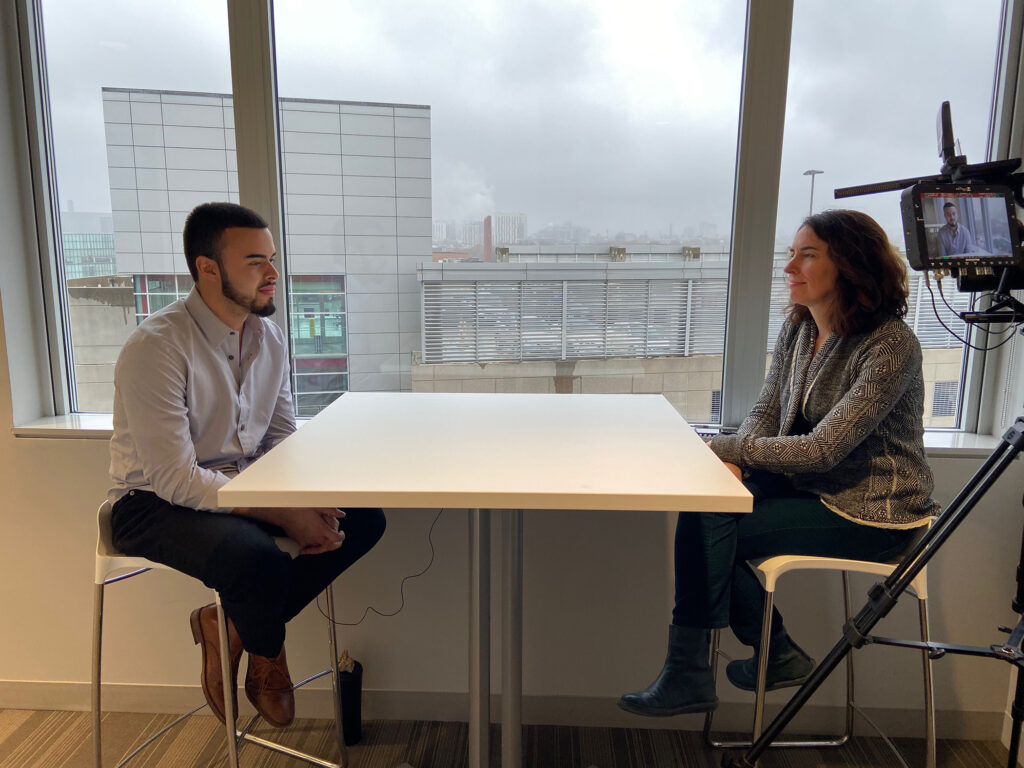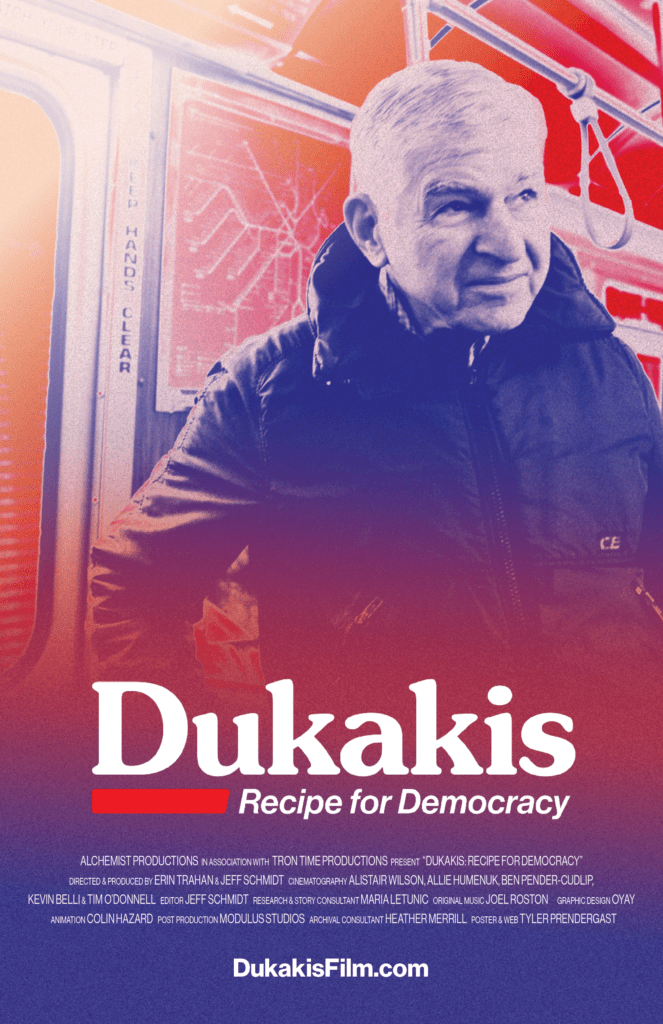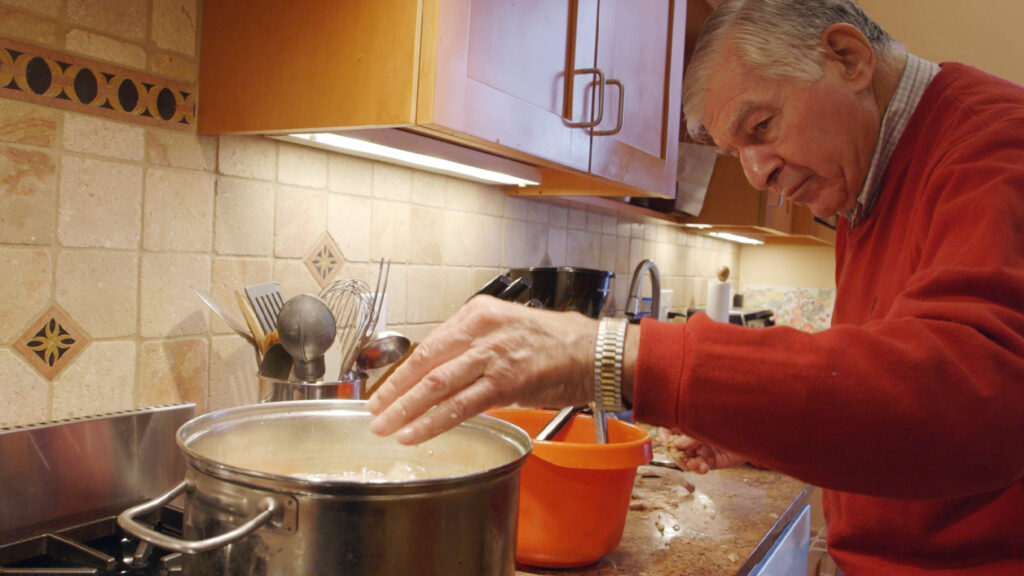Trahan’s New Doc Looks at Dukakis, Democracy, and Turkey Soup
With Election Day right around the corner, now is the perfect time for the debut of Dukakis: Recipe for Democracy, a new short film by Journalism and Visual & Media Arts affiliated faculty member Erin Trahan.
Trahan co-directed the documentary with Jeff Schmidt, and the two explored what it means to be a public servant by following Dukakis as he teaches at Northeastern University, makes turkey soup, and co-chairs a committee at the State House. The film’s world premiere will be on Tuesday, October 22, at the 10th Annual GlobeDocs Film Festival in Brookline, Massachusetts.
Trahan spoke with Emerson Today about the film, her career, and how working in the field helps her be a better Emerson educator.
This is an edited version of that conversation.
Why did you make this movie?
Trahan: In 2016, Jeff and I had been wanting to work on a film project together. We had a bunch of ideas including: What’s going on with former Massachusetts Governor Michael Dukakis these days? At that time, it’s what I’ll call, the shifting atmosphere of political discourse, and suddenly there was something about the example that Michael Dukakis has set as someone who walks the [walk] of being a public servant, and has cared about public transit from a young age until this minute. He felt very valuable in something I wanted other people to think about.
We knew about his picking up trash as he walked to work. We knew he was known for making turkey soup. We thought some of those things would make a visual story, in addition to seeing someone who ran for president do some of those things. Plain and simple: We thought there was potential for powerful imagery.

What has been your involvement with elections in the past?
Trahan: I’m definitely a committed voter who votes in all the elections, big or small. I’ve been a poll worker for the city of Boston in the past. Personally, I’ve not been an openly partisan advocate. I’ve had a bumper sticker that said something like “every vote counts.”
I believe in journalism and hyperlocal journalism educating the community and helping others for various reasons who aren’t able to get information they need and get to polls, or know their rights.
Did you know Governor Dukakis before the movie?
Trahan: I had not met him. We crossed paths an age ago. Jeff had met him because he had filmed a project with him. The truth is he came into my consciousness, like a lot of Americans, when he ran for president. I was in junior high in Michigan, and I got super exited him about running for president. I wanted him to be president, and I asked my civics teacher to run a mock election so I could vote for him.
Did you tell Governor Dukakis that?
Trahan: I did. I think the truth is he’s a modest guy. He’s not a self-congratulatory person in any way.
What did he say when you approached him?
Trahan: Initially he said no, thank you. But he responded. I wrote him a formal letter in the mail. I think he responded by email. It was like, “It’s so nice of you to reach out, but I don’t think so.” I said [to myself] that it was not a full no. I responded again, I asked what if we came to visit and talk about it. I just tried to continue a correspondence, and eventually he said, “OK, we can do an interview.”
We started in the summer of 2018, and through that process we were able to talk with him and learn about his teaching. That’s something the media hasn’t touched upon. We learned how important that teaching was to him. We liked the idea of depicting him as a mentor passing the baton to a new generation of leaders. From there he invited us into Northeastern [University] classrooms. We were able to spend some time with him in that way and get to know, in particular, one of his students, Juan Gallego, who was working as his undergrad assistant. We got to know Juan a little bit better and saw so many values in him we already had witnessed in Governor Dukakis. We decided to follow [Gallego] also.

Did you help clean up parks and go to food pantries with Dukakis?
Trahan: That would’ve been great. That would’ve been awesome. We didn’t get that chance. The pandemic definitely put a halt on our production. Some of the things we thought were possible, weren’t possible
How long did you shoot?
Trahan: We started summer 2018, and I think the final scene happened Election Day 2023.
What did you do with him?
Dukakis: We had a traditional sit-down interview. We followed him at Northeastern while teaching, while having meetings with students, while taking the T to the State House to a meeting he co-chairs a committee of the North-South Rail Link working group. …We walked around Brookline with him. It’s the city where he was born and lived almost entirely all of his adult life. We went into Brookline High School with him, where he had attended. That’s where Brookline Town Meeting meets, and his first elected role was being a Town Meeting member. And then we hung out in his kitchen as he made turkey soup. And we tried some.
How was it?
Trahan: Delicious, of course.

How does your experience of making this movie help you be a better Emerson educator?
Trahan: I’ll say it makes me a better educator, and a better journalist. My journalism has been focused on independent film for a good long while. I have made films and helped on films. I’ve always had a deep appreciation of making independent art and independent films. This has only strengthened my appreciation for the process exponentially.
I’m practicing journalism while I’m teaching it. I can say look, here’s a story I just published and we can talk about what goes into making this story. I like bringing people in who are practicing in the field into the classroom. I really want Emerson students to see that you can be teaching, making a film, and be a journalist. I think that’s where a lot of them are headed.
How do you address the democracy aspect in the movie?
Trahan: I think ultimately, we wanted to meet characters who still have faith in the American democratic process, and who were actively engaged in that because of that faith. The film itself is an example of hopefulness that getting involved can work, and good, decent people have chosen public service in the past. And young people still are today, and if we treat democracy with the care it deserves, that it will flourish.
I don’t think we always get the message that nurturing democracy is the way to go as a culture. We’re not always valuing the role of nurturing anything. And that one of the things the film subtly depicts, is there’s a caregiving aspect to democracy. It’s a way to address care and concern with each other, and that the way is to participate.
Categories